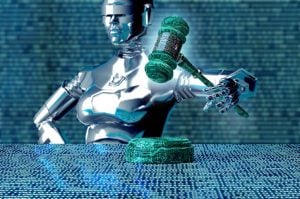[ad_1]
 Expertise and courts have by no means been an excellent match. In any case, judges are involved with precedent, whereas the know-how adoption course of is future-facing. Actually, the pandemic helped cut back the friction considerably when, out of necessity, the courts acclimated to e-filing and digital courtroom proceedings. Some judges even acknowledged the worth and comfort of on-line appearances for sure issues.
Expertise and courts have by no means been an excellent match. In any case, judges are involved with precedent, whereas the know-how adoption course of is future-facing. Actually, the pandemic helped cut back the friction considerably when, out of necessity, the courts acclimated to e-filing and digital courtroom proceedings. Some judges even acknowledged the worth and comfort of on-line appearances for sure issues.
Regardless of the notable adaptation and altering attitudes, our judicial counterparts had been wholly unprepared for the generative AI (GenAI) tsunami and its impression on the observe of regulation. For the reason that launch of GPT-4 a 12 months in the past, attorneys have more and more relied on the output of GenAI instruments to draft and submit pleadings and memoranda to the courts, typically with no full understanding of the know-how and its capabilities.
In consequence, many attorneys have made the information for submitting courtroom filings with GenAI-generated faux case citations regardless of being repeatedly warned to fastidiously overview all GenAI output. Judging by the uptick in headlines because the begin of 2024, extra attorneys than ever are counting on GenAI instruments for authorized analysis however are completely failing to fulfill their moral obligations of fundamental competence:
A lawyer was sanctioned by Massachusetts Superior Court docket for submitting a number of memoranda replete with false case citations (2/12/24).
A British Columbia lawyer was reprimanded and ordered to pay prices for opposing counsel to find precedent was AI “hallucination” (2/20/24).
A Florida legal professional was suspended by U.S. District Court docket for the Center District of Florida for submitting submissions counting on false case citations (3/8/24).
An legal professional, a professional se litigant, was referred to as out by the courtroom for submitting false case citations to courtroom for the second time, and the case was dismissed following a grant of abstract judgment on different grounds (3/21/24).
The ninth Circuit summarily dismissed a case with out addressing the deserves due to the legal professional’s reliance on faux circumstances (3/22/24).
To be clear, these conditions reveal an incapability to fulfill fundamental competence obligations. This isn’t a problem of know-how competence. As an alternative, these situations spotlight a failure by attorneys to fastidiously overview paperwork submitted to the courtroom.
It’s this dereliction that’s spurring judges into motion. Courts throughout the nation are grappling with this difficulty, with many judges signing orders that govern GenAI utilization of their courtrooms. RAILS (Accountable AI in Authorized Companies) has compiled a operating record of those efforts. Forty-eight paperwork are being tracked (for now), which embrace orders, tips, and guidelines which are both in progress or have already been issued.
The approaches concerning regulating GenAI utilization run the gamut and embrace: offering steering about GenAI utilization, requiring the disclosure of the usage of GenAI, or banning its use altogether. As defined within the RAILS declaration assertion, this haphazard and diversified set of ways, whereas well-intentioned, fails to supply much-needed consistency:
(T)he sheer variety of these orders and lack of uniformity [in] their provisions could cause appreciable confusion to litigants and practitioners who could have to seem in many various courts.
In different phrases, there’s dysfunction within the courts, with no readability in sight.
Given the rising variety of faux case citations, one factor is evident: the phenomenon highlights proof of a fair deeper drawback. Particularly, some attorneys aren’t reviewing their work earlier than submitting it to the courtroom — and this isn’t a brand new incidence.
Traditionally, circumstances that appeared misplaced throughout the context of a doc could possibly be dismissed as errors or misinterpretations of case regulation. Now, nonetheless, false case citations undeniably exhibit a failure to overview submitted work. One of these negligence undoubtedly existed earlier than, but it surely’s a lot simpler to show when the cited circumstances are nonexistent.
In different phrases, the issue isn’t the know-how, it’s legal professional competency. This can be a preexisting difficulty, and knee-jerk reactions to GenAI aren’t the answer. Whereas it’s tempting to react rapidly to disruptive applied sciences, the authorized group could be higher served by creating strong, uniform instructional tips on accountable AI use and emphasizing the timeless ideas of cautious overview and thorough authorized evaluation.
Nicole Black is a Rochester, New York legal professional and Director of Enterprise and Group Relations at MyCase, web-based regulation observe administration software program. She’s been running a blog since 2005, has written a weekly column for the Day by day Report since 2007, is the writer of Cloud Computing for Legal professionals, co-authors Social Media for Legal professionals: the Subsequent Frontier, and co-authors Prison Legislation in New York. She’s simply distracted by the potential of brilliant and glossy tech devices, together with good meals and wine. You may observe her on Twitter at @nikiblack and she or he will be reached at niki.black@mycase.com.

[ad_2]
Source link



![Don’t Google Generative AI Court Rules… Do This Instead [Sponsored]](https://bestlegalnews.com/wp-content/uploads/https://abovethelaw.com/uploads/2024/03/LN-1-Dont-google.png)
